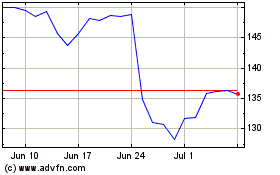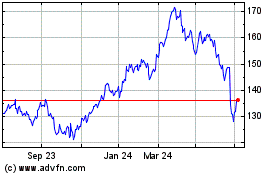Coronavirus Pandemic Hits Plan Makers, Complicates 737 MAX Return
April 08 2020 - 3:38PM
Dow Jones News
By Doug Cameron
The crisis that has embroiled the world's airlines is now
hitting the industry's biggest aircraft makers, Boeing Co. and
Airbus SE, and further challenging Boeing's efforts to return its
737 MAX to service.
Airbus said it was slashing production by about a third after
booking just 21 net orders for jets in March and delivering 36 jets
to customers, amid a flood of requests by customers to defer and
cancel orders.
Underscoring the challenge for Boeing's 737 MAX, Airbus said it
was cutting its production of the MAX's chief rival -- the A320 --
to 40 a month, down from about 60 precrisis. Chief Executive
Guillaume Faury said the company was working on "operational and
financial mitigation measures to face reality" amid the coronavirus
pandemic, including slashing spending and cutting costs at its
plants.
Boeing is trying to win Federal Aviation Administration approval
to return some 800 MAX jets to service, after two deadly crashes
blamed in part on the plane's flight-control systems.
A sharp drop in demand and government travel restrictions around
the world aimed at curbing Covid-19 fatalities have socked
airlines. Carriers have responded by grounding large chunks of
their capacity. Some 15,500 jetliners -- two-thirds of the global
fleet -- are essentially parked, according to tracking service
Cirium.
Avolon Holdings Ltd., one of the world's largest
aircraft-leasing companies, last week said it had canceled an order
for 75 MAX jets and pushed back the delivery of others until later
in the decade. The Chinese-owned firm delivered the first MAX to an
airline in 2017, but said it hadn't placed any of the new planes it
had ordered with customers. It originally expected to receive 24 of
the planes in 2020.
Boeing had hoped to restart limited MAX production in May. But
the coronavirus pandemic forced the indefinite closure of its main
assembly plants near Seattle and one in South Carolina. It has said
it expects regulators to approve the plane for flight by midyear
after it made a number of fixes to flight-systems software and
pilot training.
Before the pandemic, Boeing had planned to deliver much of its
backlog of completed MAX jets, and analysts forecast it would
assemble as many as 200 more this year. With airlines putting
planes out of service to deal with capacity cuts, those forecasts
are being cut sharply.
Boeing hasn't provided delivery guidance since the MAX was
grounded. It is expected to disclose its own monthly deliveries
next week.
"Any aircraft taken for delivery now would go straight into
storage," said Sheila Kahyaoglu, an analyst at Jefferies &
Co.
Boeing delivered just 30 jets through February, including four
military versions of commercial planes, and a dozen more in March
-- most of those at the start of the month -- according to tracking
service Planespotter.com.
Almost three-quarters of Boeing deliveries went to U.S.
carriers. Travel restrictions in place to curtail the pandemic also
limit the ability for overseas carriers to collect new deliveries
of jets.
U.S. airlines could be a bright spot for MAX deliveries.
American Airlines Group Inc. was due to receive as many as 24 MAX
jets this year. The company said it is still interested in taking
deliveries to replace older planes it has opted to retire
early.
United Airlines Holdings Inc. was down to take 32 in 2020. It
hasn't said how many it might now take, after slicing a third of
its planned capital spending for the remainder of the year.
Like Avolon, other aircraft lessors serving smaller overseas
carriers have backed away from some of their MAX commitments.
AerCap Holdings NV and Air Lease Corp., two of the largest aircraft
lessors, have either deferred some of their MAX orders or swapped
them for other Boeing jets.
Benjamin Katz contributed to this article
Write to Doug Cameron at doug.cameron@wsj.com
(END) Dow Jones Newswires
April 08, 2020 15:23 ET (19:23 GMT)
Copyright (c) 2020 Dow Jones & Company, Inc.
Airbus (EU:AIR)
Historical Stock Chart
From Mar 2024 to Apr 2024

Airbus (EU:AIR)
Historical Stock Chart
From Apr 2023 to Apr 2024
